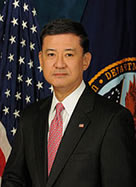
FGF E-Package
The Confederate Lawyer
June 19, 2014

Hubris, Hamartia, and Nemesis in the Shinseki Tragedy
by Charles G. Mills
fitzgerald griffin foundation
GLEN COVE, NY — In classic Greek tragedy, the protagonist is a good and decent man, but he has an inherent and fatal flaw (hamartia). He often succumbs to pride (hubris) through his belief in his own ability to correct the errors that result from his flawed nature, or perhaps his pride leads him into the errors. The result is his downfall (nemesis). This downward spiral also describes General Shinseki’s service as Secretary of Veterans’ Affairs.
General Shinseki served as Commanding General of the First Cavalry Division and as Commanding General of the United States Army in Europe. Good generals know what is happening in their command. Sometimes, they go out to a guard post in the dead of night to check on it. Sometimes, they share a drink with a private and talk to the guard. Sometimes, they allow anyone in their command to come to them during a given 15-minute period each week. Of course, their main source of information is what their key colonels and lesser generals tell them, but they never isolate themselves completely from finding things out on their own.
What [Shinseki] did not do is find out what was going on in the Department of Veterans’ Affairs. Commanding the United States Army in Europe is different from running the Department of Veterans’ Affairs…
Generals believe what their subordinates tell them. Military service is an honest profession. It could not be otherwise. It is possible that a single e-mail or radio message from a 19-year-old soldier might be the deciding factor in an important decision, and that decision could determine whether that young soldier is killed in combat. Lying is simply contrary to what military service is all about.
General Shinseki ended his military career in the second highest position in the Armed Forces — Chief of Staff of the Army. When he assumed the job of Secretary of Veterans’ Affairs, he seems to have assumed that he was fully prepared. After all, the Army is larger than the Department of Veterans’ Affairs. He actually did a lot of good things to improve services for women veterans and homeless veterans, for example.
What he did not do is find out what was going on in the Department of Veterans’ Affairs. Commanding the United States Army in Europe is different from running the Department of Veterans’ Affairs in at least one important respect. Only about one-third of the veterans’ bureaucracy has ever served in the armed forces. The employees are unionized and have long had a deceptive culture -- and an insubordinate one.
He failed to appreciate the nature of his bureaucracy and to determine whether his subordinates were regularly committing misdeeds that prevented veterans from receiving needed care.
[Shinseki] was sitting on top of a mountain of deceit that would be unthinkable in the Army.
His pride prevented him from realizing that his civilian job was not the same as a military command of the same size. It seems never to have occurred to him that he was getting false briefings and reports, and that elaborate deceptions were being used to avoid work. It seems to have been beyond his imagination that his work force was shredding claims instead of deciding them, and that waiting lists for doctors’ appointments were routinely falsified in facilities around the country. He was sitting on top of a mountain of deceit that would be unthinkable in the Army.
If only he had heeded the warnings and conducted unexpected investigations from time to time, he would have learned the extent of the many reported complaints.
What [Shinseki] did not do is find out what was going on in the Department of Veterans’ Affairs. Commanding the United States Army in Europe is different from running the Department of Veterans’ Affairs…
If only he had personally sampled the letters of complaints sent to him, he would have been alerted to the potential scope of the problem. If only he had asked a handful of Congressmen what the veteran constituents were complaining about, he would have begun to grasp the true situation. The tragedy was that he persisted in his belief that his military service had prepared him for his job. He was too proud to recognize that a problem existed and that he had a responsibility to address it. As a result, he failed to conduct reasonable investigations.
Finally, when the falsification of patient records in one hospital was exposed, he ordered the whole system investigated. But it was too late. He was shocked to learn that he had consistently been lied to, and that his leadership had been inept. His nemesis is that his career will be remembered for this disaster, rather than for his earned accomplishments. Finally, Greek tragedies were intended to be lessons; in witnessing the downfall of the tragic hero, spectators were to draw lessons and behave accordingly.
The Confederate Lawyer archives
The Confederate Lawyer column is copyright © 2014 by Charles G. Mills and the Fitzgerald Griffin Foundation, www.fgfBooks.com. All rights reserved.
This column may be forwarded, posted, or published if credit is given to Charles Mills and fgfBooks.com.
Charles G. Mills is the Judge Advocate or general counsel for the New York State American Legion. He has forty years of experience in many trial and appellate courts and has published several articles about the law.
See his biographical sketch and additional columns here.
To sponsor the FGF E-Package, please send a tax-deductible donation to the:
Fitzgerald Griffin Foundation
344 Maple Avenue West, #281
Vienna, VA 22180
1-877-726-0058
publishing@fgfbooks.com
or donate online.
@ 2025 Fitzgerald Griffin Foundation